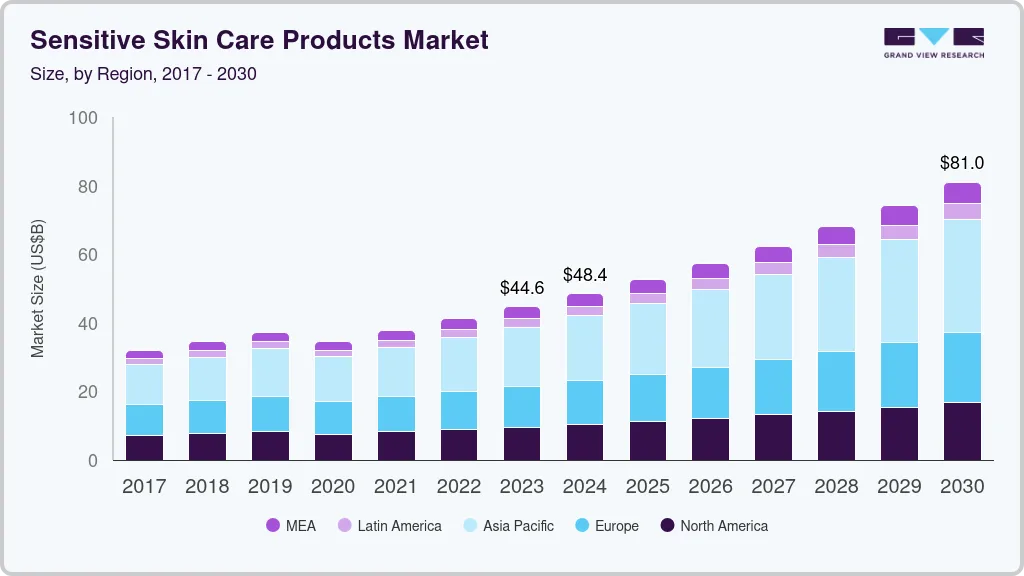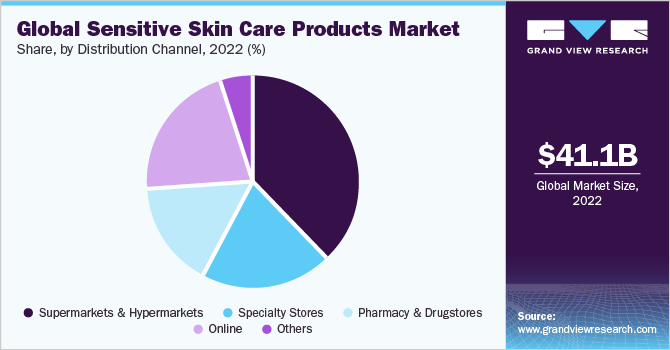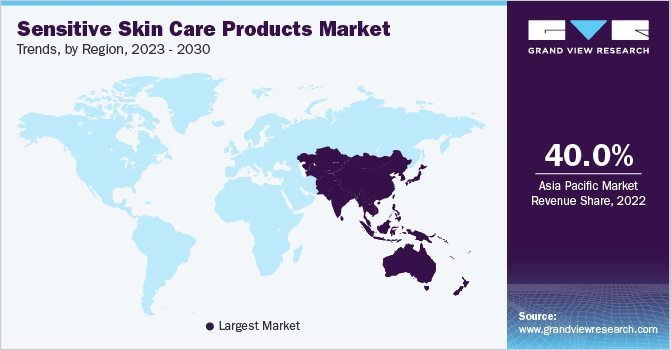- Home
- »
- Beauty & Personal Care
- »
-
Sensitive Skin Care Products Market Size Report, 2030GVR Report cover
![Sensitive Skin Care Products Market Size, Share & Trends Report]()
Sensitive Skin Care Products Market (2024 - 2030) Size, Share & Trends Analysis Report By Product (Face Care, Body Care, Lip Care), By Gender (Male, Female), By Distribution Channel, By Region, And Segment Forecasts
- Report ID: GVR-4-68040-087-5
- Number of Report Pages: 82
- Format: PDF
- Historical Range: 2017 - 2022
- Forecast Period: 2024 - 2030
- Industry: Consumer Goods
- Report Summary
- Table of Contents
- Segmentation
- Methodology
- Download FREE Sample
-
Download Sample Report
Sensitive Skin Care Products Market Summary
The global sensitive skin care products market size was estimated at USD 44.60 billion in 2023 and is projected to reach USD 80.97 billion by 2030, growing at a CAGR of 8.9% from 2024 to 2030. The market growth is attributed to significant rise in consumer awareness regarding skin sensitivities and the importance of using gentle and hypoallergenic products.
Key Market Trends & Insights
- Asia Pacific made the largest revenue contribution of around 40% to the global market in 2022.
- North America is expected to expand at a CAGR of 8.3% from 2023 to 2030.
- By product, the face care segment led the market and accounted for 54.28% share of the global revenue in 2022.
- By gender, the female gender segment led the market and accounted for 71.17% share of the global revenue in 2022.
- The supermarkets & hypermarkets distribution channel made the largest revenue contribution of around 40% in 2022.
Market Size & Forecast
- 2023 Market Size: USD 44.60 Billion
- 2030 Projected Market Size: USD 80.97 Billion
- CAGR (2024-2030): 8.9%
- Asia Pacific: Largest market in 2022
According to State of Skin Sensitivity Report 2022, published by Aveeno, 71% of individuals have sensitive skin. In only two decades, there has been a staggering 55% increase in the number of people who self-identify as having sensitive skin.

Moreover, as consumers learn more about sensitive skin conditions and treatments, they are utilizing skin care products early, which is boosting market growth. A substantial portion of the skin care products market is made up of anti-aging products like L'Oreal Revitalift, Avon Anew Sensitive+, Caudalie premier cru anti-aging cream moisturizer with hyaluronic acid, and many more that are becoming more and more popular among women.
Skin sensitivities, including conditions such as eczema, rosacea, and allergies, are becoming increasingly common. This trend has created a larger market for specialized products that cater to individuals with sensitive skin. For instance, according to Cleveland Clinic, over 31 million Americans suffer from the prevalent skin condition eczema. In addition, according to American Academy of Dermatology Association (AAD), 16 million Americans between the ages of 30 and 60 suffer from the widespread skin condition rosacea.
Advances in research and development have led to the formulation of innovative ingredients and technologies that specifically target sensitive skin concerns. This has resulted in the development of more effective and gentle products, driving consumer interest and market growth. For instance, in September 2022, BASF presented new discoveries and innovations in research techniques for the creation of effective cosmetics for sensitive skin at International Federation of Societies of Cosmetic Chemists (IFSCC) Congress.
Modern lifestyles, characterized by pollution, stress, and exposure to harsh weather conditions, can negatively impact skin health. As a result, consumers are seeking products that provide protection and relief for their sensitive skin, driving the demand for specialized skincare solutions. In addition, collaborating with dermatologists, skincare professionals, and influencers can create valuable opportunities for leading players in the sensitive skin care industry. This is expected to propel the market growth over the forecast period.
Moreover, offering personalized and customizable sensitive skin care solutions can be a significant opportunity for manufacturers. By leveraging technology and data analytics, companies can provide tailored products based on individual skin types, concerns, and preferences. This approach enhances customer satisfaction and loyalty. However, adhering to ingredient restrictions, labeling requirements, and safety assessments are the major challenges for the growth of the sensitive skin care product market.
Product Insights
In terms of revenue, the face care segment led the market and accounted for 54.28% share of the global revenue in 2022. There has been a significant increase in consumer demand for face sensitive care products. Factors such as rising awareness about skin sensitivities, changing lifestyles, and a growing emphasis on skincare routines have contributed to the growing demand for specialized products targeting sensitive facial skin.
The body care segment is anticipated to expand at a CAGR of 9.5% from 2023 to 2030. The market for body sensitive care products has experienced consistent growth in recent years. Increasing awareness about skin sensitivities and the demand for gentle and hypoallergenic products have contributed to the expansion of this market segment. Moreover, many brands provide clear and concise information about the ingredients used in their body sensitive care products are gaining trust and loyalty from consumers.
Gender Insights
In terms of revenue, the female gender segment led the market and accounted for 71.17% share of the global revenue in 2022. Increased awareness about skin sensitivities and the importance of proper skincare has driven the demand for sensitive skin care products among females. Moreover, many brands offer a wide range of products targeting specific needs of the female, such as anti-aging, hydration, acne control, or sun protection, can cater to a broader customer base. This is expected to propel the market growth over the forecast period.
The male gender segment is anticipated to expand at a CAGR of 9.3% from 2023 to 2030. Men are becoming more conscious of their skin health and are actively seeking products that cater to their specific skin concerns and sensitivities. In addition, sensitive skin care products that offer multi-functional benefits, such as combining miniaturization, sun protection, and soothing properties in a single product, align with the desire for simplicity and convenience. This is expected to boost the male segmental growth over the forecast period.
Distribution Channel Insights
The supermarkets & hypermarkets distribution channel made the largest revenue contribution of around 40% in 2022. Supermarkets and hypermarkets play a significant role in the sensitive skin care products industry by offering a diverse range of products at competitive prices, providing convenience and accessibility to consumers, and promoting and raising awareness of sensitive skin care products. Consumers easily find sensitive skin care products alongside other personal care items, making it convenient to discover and purchase products without visiting specialized stores. In the forecast term, these reasons are likely to boost the segment.

The online distribution channel is projected to expand at a CAGR of 10.3% from 2023 to 2030. The rise of e-commerce and direct-to-consumer models has transformed the way consumers purchase body sensitive care products. Online platforms provide convenience and accessibility, allowing consumers to research and compare products, read reviews, and make informed choices. Moreover, online platforms often leverage technology and data analytics to provide personalized product recommendations to customers based on their preferences, skin type, or previous purchases. This personalized approach is expected to enhance the shopping experience and increases the chances of customers finding suitable sensitive skin care products.
Regional Insights
Asia Pacific made the largest revenue contribution of around 40% to the global market in 2022. The region's sensitive skincare industry is expanding as a result of factors like population growth, increasing urbanization, and rising per capita expenditure on personal care goods in developing countries including China, South Korea, India, and Indonesia. For instance, according to the article published by William Reed in September 2021, around 44% of female skin care customers changed brands because of their sensitive skin. Additionally, one-third of Chinese consumers stated they would be willing to pay extra for a sheet mask that is ideal for their sensitive skin.

North America is expected to expand at a CAGR of 8.3% from 2023 to 2030. The regional market has been fueled by the growing awareness and concern among consumers in North America about skin sensitivities and the increased demand for specialized products. Moreover, men are increasingly interested in skincare and seek products specifically tailored to their unique needs, including products for sensitive skin. This presents opportunities for brands to tap into this growing market segment in the region.
Key Companies & Market Share Insights
The market includes both international and regional participants. Key market players are focusing on product innovation to enhance their portfolios.
-
In May 11, 2021, Galderma, has increased the scope of its consumer care offerings in Switzerland. The expansion gives customers more alternatives for their dermatological requirements. The change includes the launch of the dermatologist-recommended CETAPHIL range for sensitive skin as well as the extension of the DAYLONG brand for sun protection.
-
In October 20, 2021, ALASTIN Skincare, Inc. launched three new sensitive skincare products, Ultra Calm Cleansing Cream, SilkSHIELD All-Mineral Sunscreen SPF 30 with TriHex Technology, and Ultra Light Moisturizer with TriHex Technology. This sensitive skin line was created with ultra-calming, restorative ingredients to assist treat naturally sensitive skin or skin that has undergone cosmetic procedures.
Some of the prominent players in the global sensitive skin care products market include:
-
L'Oréal S.A.
-
Unilever PLC
-
The Estée Lauder Companies Inc.
-
Procter & Gamble Company
-
maxingvest AG (Beiersdorf AG)
-
Amorepacific Corporation
-
Pevonia International Inc
-
Johnson & Johnson Services Inc.
-
Kao Corporation
-
Sebapharma GmbH & Co. KG
Sensitive Skin Care Products Market Report Scope
Report Attribute
Details
Market size value in 2024
USD 48.43 billion
Revenue forecast in 2030
USD 80.97 billion
Growth rate
CAGR of 8.9% from 2024 to 2030
Base year for estimation
2023
Historical data
2017 - 2022
Forecast period
2024 - 2030
Quantitative units
Revenue in USD billion, and CAGR from 2024 to 2030
Report coverage
Revenue forecast, company ranking, competitive landscape, growth factors, and trends
Segments covered
Product, gender, distribution channel, region
Regional scope
North America; Europe; Asia Pacific; Central & South America; Middle East & Africa
Country scope
U.S.; Canada; Germany; UK; Italy; France; China; India; Japan; South Korea; Brazil; UAE; South Africa
Key companies profiled
L'Oréal S.A., Unilever PLC, The Estée Lauder Companies Inc., Procter & Gamble Company, maxingvest AG (Beiersdorf AG), Amorepacific Corporation, Pevonia International Inc, Johnson & Johnson Services Inc., Kao Corporation, Sebapharma GmbH & Co. KG
Customization scope
Free report customization (equivalent up to 8 analyst’s working days) with purchase. Addition or alteration to country, regional & segment scope.
Pricing and purchase options
Avail customized purchase options to meet your exact research needs. Explore purchase options
Global Sensitive Skin Care Products Market Report Segmentation
This report forecasts revenue growth at global, regional, and country levels and provides an analysis of the latest industry trends in each of the sub-segments from 2017 to 2030. For the purpose of this study, Grand View Research has segmented the global sensitive skin care products market report on the basis of product, gender, distribution channel, and region.
-
Product Outlook (Revenue, USD Billion, 2017 - 2030)
-
Face Care
-
Face Creams & Moisturizers
-
Cleansers & Face Wash
-
Serums and Essence
-
Sunscreen
-
Others
-
-
Body Care
-
Body Creams & Moisturizers
-
Body Wash
-
Sunscreen
-
Others
-
-
Lip Care
-
Lip Balms
-
Lip Scrub
-
Others
-
-
-
Gender Outlook (Revenue, USD Billion, 2017 - 2030)
-
Male
-
Female
-
-
Distribution Channel Outlook (Revenue, USD Billion, 2017 - 2030)
-
Supermarkets & Hypermarkets
-
Specialty Stores
-
Pharmacy & Drugstores
-
Online
-
Others
-
-
Regional Outlook (Revenue, USD Billion, 2017 - 2030)
-
North America
-
U.S.
-
Canada
-
-
Europe
-
Germany
-
UK
-
France
-
Italy
-
-
Asia Pacific
-
China
-
India
-
Japan
-
South Korea
-
-
Central & South America
-
Brazil
-
-
Middle East & Africa
-
UAE
-
South Africa
-
-
Frequently Asked Questions About This Report
b. The sensitive skin care products market was estimated at USD 41.12 billion in 2022 and is expected to reach USD 44.61 billion in 2023.
b. The sensitive skin care products market is expected to grow at a compound annual growth rate of 8.8% from 2023 to 2030 to reach USD 80.97 billion by 2030.
b. Asia Pacific dominated the sensitive skin care products market with a share of around 40% in 2022. This is owing to an increase in disposable income and a growing middle-class population, leading to a higher spending capacity on beauty and skincare products, and the rapid growth of e-commerce platforms and social media in the region.
b. Some key players operating in the sensitive skin care products market include L'Oréal S.A., Unilever PLC, The Estée Lauder Companies Inc., Procter & Gamble Company, maxingvest AG (Beiersdorf AG), Amorepacific Corporation, Pevonia International Inc, Johnson & Johnson Services Inc., Kao Corporation, and Sebapharma GmbH & Co. KG.
b. Key factors that are driving the sensitive skin care products market growth include the rising prevalence of skin sensitivities, modern lifestyles, environmental factors such as pollution, harsh weather conditions, and stress, and growing demand for personalized and customizable sensitive skin care products.
Share this report with your colleague or friend.
Need a Tailored Report?
Customize this report to your needs — add regions, segments, or data points, with 20% free customization.

ISO 9001:2015 & 27001:2022 Certified
We are GDPR and CCPA compliant! Your transaction & personal information is safe and secure. For more details, please read our privacy policy.
Trusted market insights - try a free sample
See how our reports are structured and why industry leaders rely on Grand View Research. Get a free sample or ask us to tailor this report to your needs.










